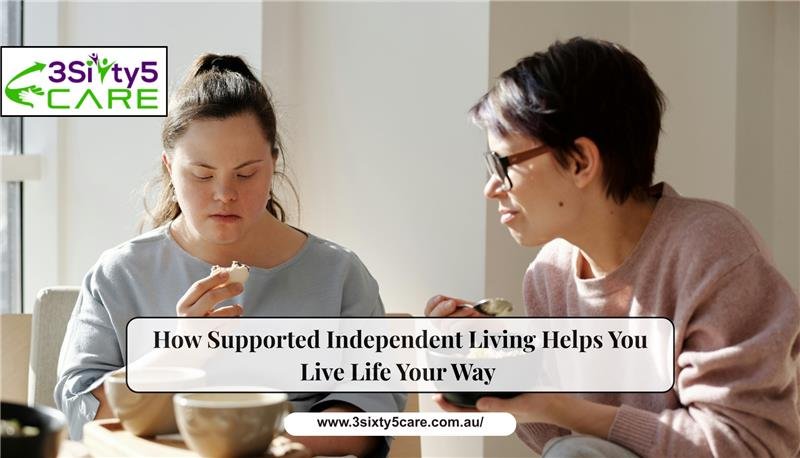A Home That Supports Your Independence
Living independently represents an essential life element for many disabled individuals rather than just being a target to reach. Supported Independent Living (SIL) emerges as a solution for people with disabilities. SIL provides independent living solutions for individuals with higher support needs registered with NDIS through daily assistance and supervision.
What Is Supported Independent Living?
The NDIS-funded Supported Independent Living (SIL) program enables people with disabilities to live more independently through shared housing arrangements. Supported Independent Living programs sometimes enable people to live independently.
Trained SIL support workers provide routine help with personal care tasks as well as cooking, cleaning, medication administration and other daily life activities. Our objective is to enable you to build confidence as well as essential life skills in a secure and supported environment.
What Support Does SIL Include?
- Personal care such as bathing, dressing, and grooming
- Medication management and reminders
- Help with meal planning and cooking
- Assistance with laundry and cleaning
- Behavioural support and emotional regulation
- Social skill development and community outings
- 24/7 supervision, including active or passive overnight support
Who Is Eligible for Supported Independent Living?
- Have higher or complex support needs
- Require daily assistance or 24/7 supervision
- Want to move out of your family home
- Have SIL funding included in your NDIS plan
What Are the Living Arrangements in SIL?
Shared Living
Single-Occupancy SIL
Some people may receive SIL in a private residence, especially if they have complex behaviours, medical needs, or if shared living isn’t suitable. This option still includes regular support staff and assistance.
SIL vs Other NDIS Supports: What's the Difference?
It’s important to know how Supported Independent Living compares to other NDIS housing and support options:
| Support Type | What It Covers |
| SIL | Daily support in a shared or individual home |
| SDA (Specialist Disability Accommodation) | The physical housing for people with extreme functional impairment |
| ILO (Individualised Living Options) | Flexible, tailored living arrangements based on your preferences |
| STA (Short-Term Accommodation) | Temporary stays for rest, respite, or emergencies |
What Does SIL Funding Cover?
- Wages and training of support staff
- Daytime and overnight support
- Help with personal care, cleaning, and cooking
- Behavioural and emotional support
- Daily documentation and progress tracking
What SIL Funding Doesn’t Cover
- Rent or mortgage payments
- Utility bills like electricity, gas, or internet
- Food and grocery costs
- Personal expenses (clothing, phone bills, entertainment)
Choosing the Right Supported Independent Living Provider
Choosing the appropriate SIL provider can ensure that you feel much more comfortable, safe, and can achieve success in a long term. The following are some things to watch out for:
- Are they a registered NDIS provider?
- Do they offer individualised support plans?
- Are staff experienced, trained, and compassionate?
- Do they involve you in decisions and respect your preferences?
- Can you meet the team or tour the home before moving in?
- How do they handle emergencies, feedback, or changes in needs?
What a Typical Day in a SIL Home Looks Like
Morning
- Wake-up support and personal care
- Medication and breakfast preparation
- Planning the day or attending appointments
Midday
- Support to attend work, TAFE, or a day program
- Grocery shopping or meal preparation
- Relaxing or working on personal goals
Afternoon
- Laundry, cleaning, or life skills training
- Support with hobbies, social outings, or therapy sessions
Evening
- Cooking and eating dinner
- Taking medication and winding down
- Personal hygiene and bedtime routine
- Overnight supervision (if required)
Benefits and Challenges of Supported Independent Living
Pros of SIL:
- 24/7 support tailored to your needs
- Encourages growth and independence
- Opportunity to learn life skills
- Social opportunities and housemate bonding
- Structured, consistent routines
- Support for both physical and mental wellbeing
Things to Consider:
- Shared living may reduce privacy
- Compatibility with housemates is important
- Adjusting to new routines may take time
- May involve waitlists for placement
Final Thoughts: Is SIL Right for You?
Supported Independent Living goes beyond basic daily assistance by giving individuals an opportunity to develop personal growth while establishing connections and gaining control over their lives. Through SIL support you can build a solid foundation for lasting wellbeing and independence whether you need help moving out for the first time or require constant support while building confidence.





